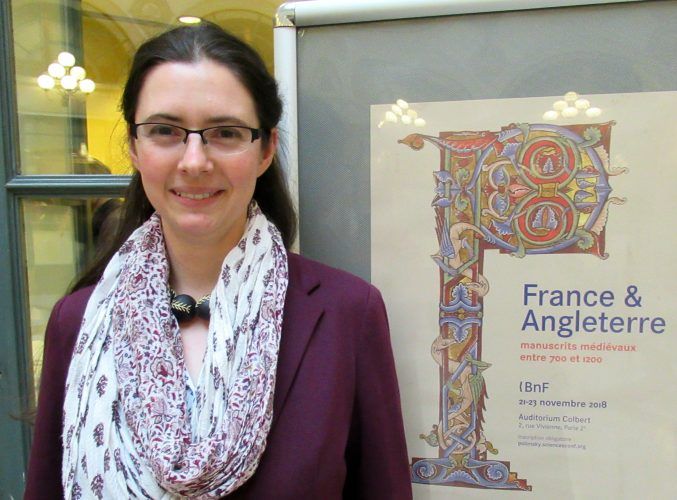Trinity researchers win prestigious European Research Council awards
Posted on: 29 November 2018
Two researchers from Trinity—Ussher Lecturer in Medieval Art in the School of Histories and Humanities, Dr Laura Cleaver, and Assistant Professor in the School of Physics, Dr Aline Vidotto—have won prestigious European Research Council (ERC) Consolidator Grant awards valued at €2 million each. The successes bring Trinity’s total number of ERC grants awarded under the EU Horizon 2020 funding competition to 26.
Dr Cleaver will investigate the significance of the trade in medieval manuscripts for the development of ideas about the nature and importance of European culture. Dr Vidotto will quantify how streams of gas that pour out from stars influence the loss of atmospheres of planets outside our own solar system (exoplanets), which orbit close to their stars.
ERC awards support investigator-driven, frontier research across all fields, and are awarded on the basis of scientific excellence. The Consolidator Grants support talented, mid-career researchers who have recently built independent, excellent teams and wish to strengthen them. These grants, which support five-year projects, are among the most sought-after and competitive in the world of research.
Dean of Research at Trinity, Professor Linda Doyle, said:
Dr Cleaver and Dr Vidotto are very deserving awardees. They are driven by curiosity, creativity and a desire to understand the world. It is so important that the European Research Council continues to strongly fund basic and fundamental research and allows talent to flourish.
Research Development Manager at Trinity, Doris Alexander, added:
Trinity’s continued performance in the ERC programme is reflective of the successful outcome of a partnership approach between our excellent researchers and the supports provided by the ERC support officers and locally based RPOs in the Research Development office. Supports offered by national agencies are also vital to nurture success and we hope that existing supports will be maintained.
The basis of the ERC programme is investigator-driven scientific excellence and as we move into the latter years of Horizon 2020 and into the successor programme, Horizon Europe, we urge the European Parliament, Council and our national ministers involved in discussions around the future of the programme and ERC within it, to ensure that there is no dilution of this fundamental sole evaluation criterion of scientific excellence.
Dr Cleaver’s project, CULTIVATE MSS, will examine the trade in medieval manuscripts in the early 20th century, focusing on England, France, Germany and the US. It will assess the impact of a small group of very wealthy collectors on the development of the library collections and scholarship that have played an extremely important role in shaping how we think about the past and cultural heritage.

Dr Laura Cleaver said:
I am delighted and honoured to be awarded this grant. It is wonderful to receive such a vote of confidence from an international panel of senior colleagues and I am really looking forward to developing this research into some of Europe’s cultural treasures.”
“In particular, the project will assess the contributions of women to shaping collections, and attempts to control the movement of manuscripts in an era in which books were increasingly identified as objects of national significance.
Project ASTROFLOW will see Dr Vidotto use her expertise in stellar wind theory and 3D simulations to produce next-gen models that account for the major underlying physical processes of atmospheric losses in exoplanets.

Dr Aline Vidotto said:
I am absolutely thrilled to have won this ERC Consolidator Grant award. The numerical modelling that my team will develop will enable us to interpret observations with Hubble and, in the future, with CUTE, and also to guide observers towards exoplanets where we could more easily observe these leaking atmospheres. We want to understand what happens to the atmospheres of these big close-in exoplanets when they collide with the very intense outflows from their host stars.
Although the exoplanets we will focus on in the project are very unlikely to host life—they are way too hot due to the close proximity to the star—understanding the extreme environments of these exoplanetary atmospheres can shed some light in our big quest to understand the potential for exoplanets to develop life.
Trinity is committed to supporting applications to the ERC and has, over the past three years, performed extremely well in that endeavour, winning almost 50% of the ERC grants awarded to researchers at institutions in Ireland.
There are significant supports available to researchers interested in pursuing this funding, including workshops and individual support from Trinity’s Research Development Office ERC Research Project Officers, and the locally based Research Programme Officers. Researchers also have access to an Enterprise Ireland ERC proposal development fund of €16,000, while the IRC Laureate programme (which saw Trinity recently win 13 awards to the value of €6.5M) has been launched to leverage even greater success for the Irish research system in European Research Council awards.
For more information about the ERC Consolidator Grants, see here.
